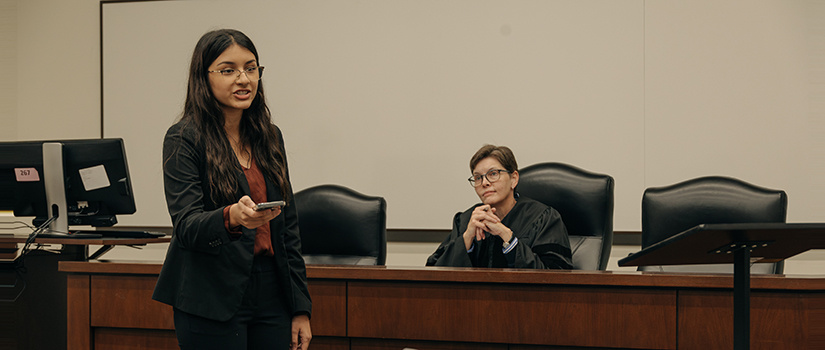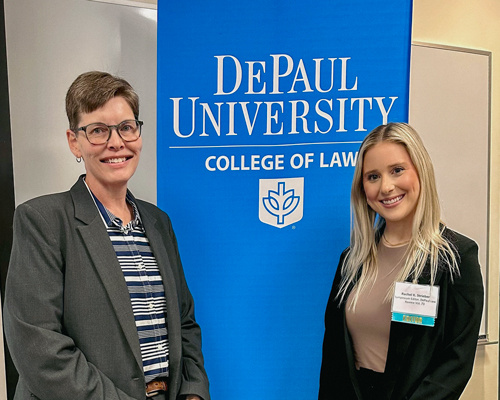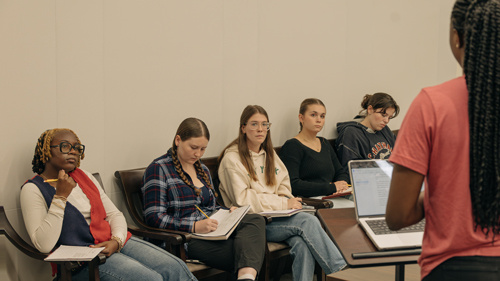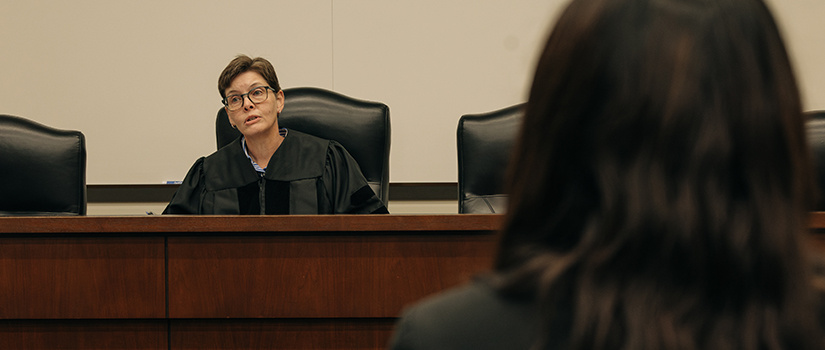Every semester, professor Jan Baker brings a book of writing prompts to her South Carolina Honors College class. It’s tattered and worn, and she’s had to tape the cover back on, but these are not signs of neglect or misuse. For nearly a decade, Baker’s Honors students have taken the book home each week and answered a prompt of their choosing. Then, they’ve presented their writing to the rest of the class.
“Working with Honors students is an absolute joy...they’re willing to be vulnerable with one another,” says Baker. “It’s just so rewarding to work with bright minds that are open. They want to learn. They want to be challenged.”
While this exercise might appear to be part of a fiction writing class, Baker has made it a key component of her Honors course, Tell Me a Story: Storytelling and Argumentation Ethics in Legal Advocacy. The legal writing instructor at the University of South Carolina Joseph F. Rice School of Law has taught the course since 2015.
“Overall, this course was a really great introduction to the legal field without being too overwhelming or technical,” says sophomore Carolina scholar and political science major Madison Hahn. “I continue to recommend this class to all of my peers regardless of their majors, as this material is easy to have fun with and has many applications.”
By teaching legal writing and principles of law through the lens of storytelling, Baker has helped Honors students gain an appreciation of the legal field — and guided many through the law school application process.

“Working with professor Baker unlocked a career goal and passion for legal research and writing that I did not even know I had, and I attribute that completely to professor Baker’s encouragement and teaching,” says 2021 SCHC graduate Rachel Strieber. “I am proud to call professor Baker my mentor.”
Engaging with eager minds
Baker’s own path to the legal field was through an English degree. In high school, her English teacher noticed that she was a talented writer and encouraged her to pursue the major in college.
“It took me a long time to decide that because I wasn’t sure what I was going to do with an English major, but it ended up being something that I really, really loved,” says Baker. “So not just the writing part, but also all the other parts of an English degree — so the literature, all of that.”
This foundation prepared her for the program at USC’s law school, where she learned to adapt her skills into the concise, precise genre of legal writing. While in school, Baker worked as a teaching assistant for a legal writing class and discovered her passion for instruction. As her legal career began, Baker still found opportunities to teach: first at Florida Coastal Law School and a Florida paralegal program, then at USC when she returned to South Carolina.
“Every new session I got new faces and new people who had eager minds to learn,” says Baker. She’s fascinated by the learning process and enjoys watching her students — many of whom do not have a background in law or political science — master new concepts and apply them in their writing. In 2006, she made the career transition from bankruptcy law to being a full-time legal writing instructor at USC’s Joseph F. Rice School of Law.
Training credible storytellers
Baker noticed a call for proposals to teach Honors pro seminars, and she was inspired by a book she’d just finished reading, Philip Meyer’s Storytelling for Lawyers. Drawing upon her background in literature and law, Baker developed an Honors course that would “get students, particularly undergraduate students, but students, thinking about what lawyers do. We tell stories, we tell other people’s stories,” Baker explains.

“Before professor Baker’s course, I never identified myself as a storyteller, but I now consider it one of my strongest professional traits,” says Strieber, who recently graduated from DePaul University College of Law. “Professor Baker exemplified and taught me that the first step in any conversation is to get the other person to listen, and this lesson is something I have kept in mind throughout undergrad, law school and now my career as an attorney.”
At the beginning of each semester, Baker’s students observe that the most compelling stories are relatable and detailed. From these beginnings, Baker guides students through a series of assignments that help them understand how narrative elements, such as plot, setting, character, theme, voice and detail can create a compelling legal argument. She also challenges them to consider their audience; after all, persuasion is a key component of the legal field.
“The storytelling is what gets the parties interested in the case, and particularly we spend a lot of time talking about not just the writing part all by itself, but the presentation of the story. So lawyers tell stories in writing, and they also tell stories on their feet in front of juries,” says Baker. “And that’s where the storytelling really becomes important. It’s because you have to be a credible storyteller, and you have to have a firm grasp of the facts that go into your story when you’re standing in front of that jury.”
To give her students an authentic experience, Baker holds the class at the law school. When students give presentations or simulate trials, they gain the experience of doing so in a courtroom-style classroom. Throughout the semester, students write and present stories about their own lives, and they also study films to analyze storytelling techniques. The course culminates in a mock trial in which students represent both sides of a burglary case.
“Half of them are appointed to represent the defendant. Half of them are appointed to represent the state, and then we start working through,” Baker explains. “One of the first things they have to do with the case file is to prepare an opening statement or a closing argument for the trial, so they have to be able to tell the story from the perspective of their client.”
Though the cases remain the same from year to year, Baker is impressed by the creativity and interpretations that each new class brings to her assignments. For example, a student created a portfolio of crime scene photos to accompany the burglary case, which Baker continues to use.
“Just when I think I’ve had a class of the smartest group I will ever see, in comes the next group, the next fall, and they’re sharper, they’re smarter. They’re just creative.”
Baker’s students recognize her passion and creativity, as well. “The best thing about this class was, by far, professor Baker’s instruction,” Hahn attests. “Coming into the class, I was worried that, as a law school professor, she would have higher expectations and be more rigid. This could not be further from the truth. She did an excellent job of setting fair expectations for the students in her class while also pushing us to meet the higher standards that law schools may expect.”
A lifelong mentor
When asked about her approach to teaching, Baker shares that she strives to be kind but firm — and that she never wants her class to feel like a burden to students. “I want them to come to class because they enjoy it,” she says. “I want them to do well on the assignments because it’s important to them to show me what they’ve learned, and I try to generate mutual respect.”

This atmosphere of respect has encouraged students to ask for Baker’s professional opinion, and she has mentored numerous students through the law school discernment process. She’s written recommendation letters, helped students decide between acceptances and provided guidance throughout former students’ law school and legal careers.
“Even after her class, she has been willing to connect me to her colleagues for further information, as well as be a huge aid in post-graduate plans,” says Hahn. “I took this class a whole year ago, and she is still willing to stay in contact with me and help however she can.”
This past spring, Baker had the opportunity to reconnect with Strieber. Before graduating from law school in May, Strieber invited Baker to Chicago for DePaul University College of Law’s Annual Law Review Symposium. As symposium chair, Strieber chose the theme of storytelling, based on her experience in Baker’s class.
“It was great because we got to speak together about storytelling and share a little bit about the class and how her interest in it grew,” Baker recalls.
Strieber hoped to introduce Baker’s lessons to a wider audience, and she did just that: More than 500 people attended the symposium. “Professor Baker was eager to participate and a joy to work with on the most important event of my law school career,” she says. “The immense positive feedback I received, specifically regarding professor Baker’s keynote presentation, is a testament to professor Baker’s quality of teaching and impact on diverse audiences.”
Hahn and Strieber are just two examples of the ways in which Baker’s lessons and concepts have spread to the next generation of students — and lawyers, engineers, accountants, writers, artists, teachers, physicians and anyone who found themselves in Baker’s class with that book of prompts in their hands. The lessons and stories transcend the walls of the classroom and the courtroom.
“So often lawyers are represented in our society as being really bad people,” Baker reflects. “But then when we talk about what lawyers do and the job that lawyers have to tell the stories of other people, that puts a different light on the work that lawyers do. I want them to leave the class thinking there’s a different way to think about lawyers.”
